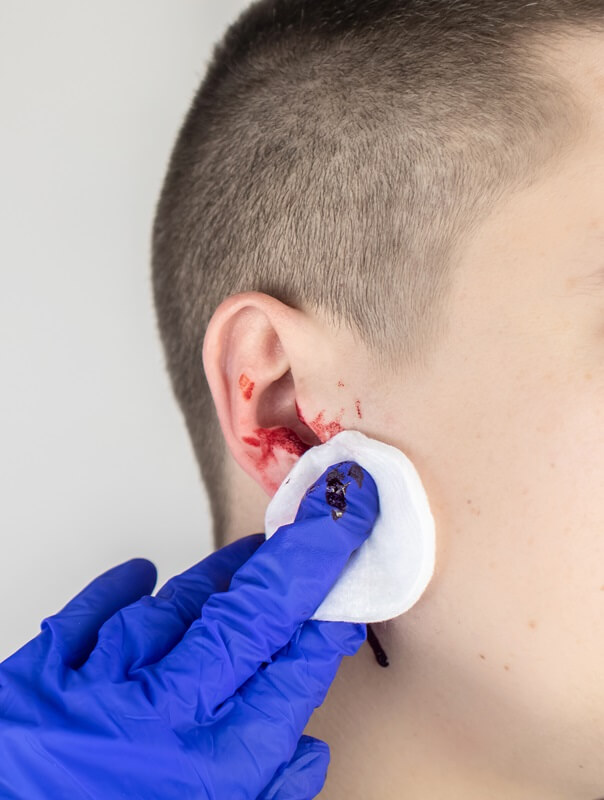
Noticing fluid leaking from your ear can be an unpleasant and worrying discovery. This condition, known medically as otorrhea, is your body’s way of sending a signal that something is wrong. While a little earwax is normal, persistent or unusual ear discharge is a red flag that you should not ignore.
Therefore, understanding the potential causes is the first step toward getting the right treatment. This guide breaks down the leaky truth about otorrhea and explains when it’s time to see a doctor.
What Is Otorrhea? Decoding the Discharge
First, let’s define the term. Otorrhea is the medical name for any type of fluid draining from the ear. This discharge can look different depending on the cause. For instance, it might be:
- Clear and watery
- Thick and pus-like (yellow or green)
- Bloody
- Foul-smelling
Recognizing the type of discharge can give you and your doctor important clues about the underlying problem.
Common Causes of a Leaky Ear
Several conditions can lead to otorrhea. The most common culprits include:
1. Middle Ear Infection (Otitis Media)
This is a very common cause, especially in children. When fluid builds up behind the eardrum during an infection, the pressure can cause the eardrum to tear or rupture. As a result, pus and fluid will drain out, which often relieves the pain.
2. Swimmer’s Ear (Otitis Externa)
This is an infection of the outer ear canal itself. It happens when water gets trapped in the ear, creating a moist environment for bacteria to grow. Consequently, you may notice itching, pain, and a thin, often foul-smelling discharge.
3. A Ruptured Eardrum
Besides an infection, an eardrum can also rupture from a head injury, a sudden loud noise, or even from sticking an object like a cotton swab too far into your ear. This can cause clear, bloody, or pus-filled fluid to leak out.
4. A Foreign Object
This is another common issue, particularly with young children who may put small toys, beads, or food in their ears. The object can cause irritation and infection, leading to discharge.
5. Cholesteatoma (A More Serious Cause)
In some rare cases, chronic otorrhea can be a sign of a cholesteatoma. This is an abnormal, non-cancerous skin growth that can develop in the middle ear. It can cause persistent, foul-smelling discharge and must be treated surgically.
How Doctors Diagnose and Treat Otorrhea
A doctor can usually find the cause with a simple examination. First, they will use an otoscope to look inside your ear canal. Then, if an infection is suspected, they might take a swab of the discharge to send to a lab.
Treatment is aimed at the specific cause:
- For Ear Infections: A doctor will likely prescribe antibiotic or antifungal ear drops. Sometimes, oral antibiotics are also needed.
- For a Ruptured Eardrum: Most small tears heal on their own. However, a doctor will prescribe antibiotics if an infection is present to prevent further complications.
- For a Foreign Object: Never try to remove a stuck object yourself. A doctor has the proper tools to do this safely.
For more expert information, you can visit a trusted source like the American Academy of Otolaryngology for tips on safe ear care.
When You Absolutely Must See a Doctor
While some minor cases might seem harmless, you should see a doctor immediately if:
- The discharge follows a recent head injury (it could be cerebrospinal fluid).
- You have a high fever, severe pain, or dizziness.
- You experience a sudden loss of hearing.
- The discharge is bloody or has a very foul smell.
- The symptoms last for more than a couple of days.
If you are dealing with frequent ear issues, you might find helpful tips in our guide to preventing ear infections.
In conclusion, ear discharge is more than just a minor annoyance; it’s a clear signal from your body. By listening to this sign and seeking timely medical care, you can address the root cause, protect your hearing, and ensure a quick and healthy recovery.
FAQ: Fast Facts About Otorrhea
Q: Can ear discharge be a sign of a brain issue?
A: Rarely, but CSF leaks after trauma or surgery can cause clear discharge. Immediate medical attention is needed.
Q: Can I treat otorrhea at home?
A: Mild swimmer’s ear might improve with over-the-counter drops, but most cases need medical attention.
Q: Is otorrhea contagious?
A: The discharge itself isn’t, but the underlying infection can be, depending on the cause.
Got ear trouble? Don’t just live with it — get it checked, get it treated, and protect your hearing for life.

